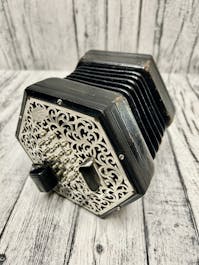Concertinas
Very good condition Lachenal 48 key English concertina. Fully working order and recently serviced.
Supplied in a padded gig bag
Concertina range at Eagle Music Shop
A concertina, like the various accordions and the harmonica, is a member of the free-reed family of instruments. The concertina was developed (probably independently) in both England and Germany. The English version was invented in 1829 (with a patent for an improved version filed in 1844) by Sir Charles Wheatstone; the German version was announced in 1834 by Carl Friedrich Uhlig. Concertinas typically have buttons on both ends and are distinguished from an accordion (piano or button) by the direction of their button travel when pushed. Concertina buttons travel in the same direction as the bellows whereas accordion buttons travel perpendicular to the direction of the bellows. Additionally, each button will produce one note, as opposed to many accordions which have the ability to produce chords with a single button.



